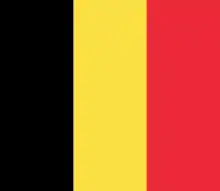1945 in Belgium
| |||||
| Decades: |
| ||||
|---|---|---|---|---|---|
| See also: | Other events of 1945 List of years in Belgium | ||||
Events in the year 1945 in Belgium.
Incumbents
- Monarch: Leopold III,[1] with Prince Charles as regent.
- Prime Minister: Hubert Pierlot (until 12 February), Achille Van Acker (starting 12 February)
Events
- January
- 1 January
- Operation Bodenplatte is launched.
- The Chenogne massacre is committed.
- 2–5 January – The Battle of Bure is fought.
- 11 January – Socialists leave the government.[2]:861
- 16 January – Wildcat strike in the Port of Antwerp over payment of danger money.[2]:861
- 25 January – The Battle of the Bulge ends.
- February
- 4 February – Liberation of Belgium complete.
- 7 February – Hubert Pierlot's government resigns.[2]:861
- 12 February – Achille Van Acker heads government of national unity.
- March
- 20 March – Financial agreement signed between National Bank of Belgium and Bank of France.[2]:861
- April
- 29 April – General Federation of Belgian Labour founded.[2]:861
- May
- 6 May – Central office of the Belgian Socialist Party publicly opposes the return of Leopold III.[2]:862
- 12 May – The Prime Minister and Prince Regent meet with the king to discuss his return.[2]:861
- 14 May – Anti-monarchist rioting in Liège.[2]:863
- June
- 9 June – Committees for collective bargaining established.[2]:861
- 14 June – King communicates to the Prime Minister that his health now allows him to return to Belgium.[2]:861
- 15 June – Yser Tower dynamited.[2]:861
- 16 June – Prime Minister proffers his resignation over the issue of the Royal Question.[2]:861
- July
- 15 July – Government resumes its activities after the Prince Regent declined to accept the Prime Minister's resignation.[2]:861
- 30 July – National Labour Congress demands 20 per cent pay increases, 8 paid days off each year, and family assistance.[2]:861
- August
- 2 August – Catholic Party removed from government of national unity in reshuffle.[2]:861
- 17 August – Forty Belgians among those liberated from the Japanese-run Weixian Internment Camp in northern China.[3]
- 18 August – Opening of the founding conference of the Christian Social Party.[2]:864
- September
- 19 September
- About 200,000 collaborators deprived of their civil and political rights.[2]:864
- National Theatre of Belgium founded under the influence of Herman Teirlinck.[2]:864
- 30 September – Leopold III publicly declares that he will accept whatever the decision of the people will be on his return.[2]:861
- October
- 21 October – Walloon Congress calls for regional autonomy in the Belgian state.[2]:864
- November
- 6 November – Government publishes a white paper on the Royal Question.[2]:861
- December
- 27 December – Belgian membership of United Nations ratified.[2]:865
- 28 December – Belgavox begins producing cinema newsreels.[2]:865
Publications
- Charles Verlinden, Les Empereurs Belges de Constantinople (Brussels, Charles Dessart)
Art and architecture
- July
- 3 July – Art association Jeune peinture belge established in Brussels, with Willy Anthoons, René Barbaix, Gaston Bertrand, Anne Bonnet, Jan Cox, Jack Godderis, Emile Mahy, Marc Mendelson, Charles Pry, Mig Quinet, Rik Slabbinck and Louis Van Lint among the founding members.[2]:863
Births
- 1 March - Wilfried Van Moer, footballer
- 6 April - Léon Dolmans, footballer
- 29 May - Daniel Van Ryckeghem, road bicycle racer
- 12 June - Henri Xhonneux, film director
- 19 August – Jacques De Decker, writer (died 2020)
- 20 September - Nicolas Dewalque, footballer
- 22 September - Ann Christy (singer)
- 25 September - Frans Janssens, footballer
- 6 October - Luc Sanders, footballer
- 16 November - Jan Bucquoy, anarchist
Deaths
- 1 January – Émile Fairon (born 1875), archivist
- 10 January – August Vermeylen, art historian
- 11 April – Kamiel Van Baelen, novelist, in Dachau concentration camp
- 30 May – Roger Libbrecht, last of the thirteen colonels who headed the Secret Army
- 23 August – Princess Stéphanie of Belgium
- 14 December – Victor de Laveleye, liberal politician, newsreader on the BBC's wartime Radio Belgique
- 27 December – Georges Hulin de Loo, art historian
- 30 December – Jules Pappaert, footballer
References
- "Leopold III, king of Belgium". Encyclopedia Britannica. Retrieved 28 March 2019.
- Alain de Gueldre et al., Kroniek van België (Antwerp and Zaventem, 1987).
- Michaëla Ngindu (Feb 2019). "Le difficile parcours vers la liberté des Belges enfermés dans les camps japonais". La Libre Belgique (in French).
| Wikimedia Commons has media related to 1945 in Belgium. |
This article is issued from Wikipedia. The text is licensed under Creative Commons - Attribution - Sharealike. Additional terms may apply for the media files.
